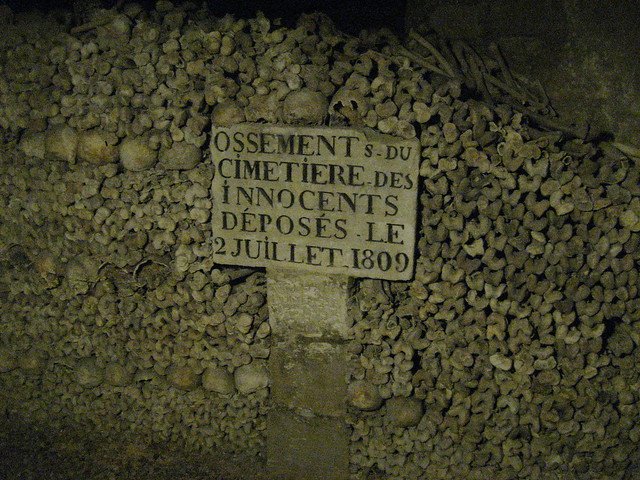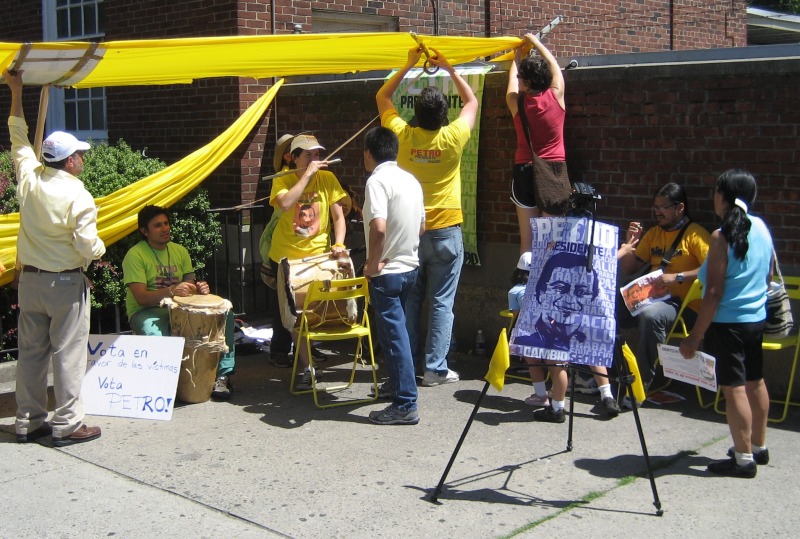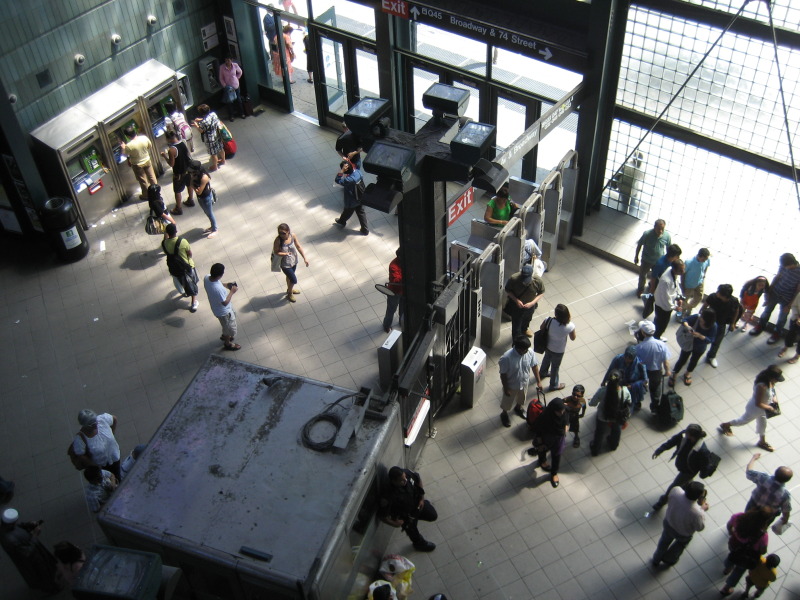Link:
https://dannyman.toldme.com/2010/10/20/dan-choi-is-a-her/
He says he has never been a fan of waiting . . . for stuff like the appeals process to go through. Our nation needs soldiers!
http://boyculture.typepad.com/boy_culture/2010/10/they-want-him-for-a-new-recruit.html
He was previously discharged due to his homosexuality. The “Don’t Ask Don’t Tell” policy has been repealed by a court, but the Obama administration is going to appeal the repeal. (I don’t get that.)
The military needs soldiers, and Dan Choi is a West Point graduate who speaks Arabic. If he wants to serve he should damn well be allowed to serve, and that he risks being discharged yet again if DADT gets re-instated (thanks, Obama!) is just a further testament to his bravery: he’s willing to serve despite the very real risk that he will be discharged yet again . . . dude is a hero.
(Via annpersand.)
Feedback Welcome
Link:
https://dannyman.toldme.com/2010/09/07/immolate-yourselves-assholes/
The people who plan to burn Korans to commemorate 9/11 sicken me. I would burn a Bible to piss them off, except I don’t think it is ever right to burn books. Which got me looking up a quote, and reading some good stuff via Wikipedia. I like that Heinrich Heine, foretelling the mess that Germany would make a century later.
Korans have already been burned: by the 9/11 hijackers themselves, along with all the bodies they incinerated. Fundamentalist Muslims already do enough damage to their own people, their own faith, and their own holy text that posers from outside the faith really have nothing to add. The difference between these lazy, bigoted American fuckwits who want to burn holy books and your average terrorist is the latter is somewhat more industrious, and less inhibited, more concerned with their vision of faith than with worldly comforts. They are both points on the same axis: “where they burn books, they will ultimately also burn people.”
2 Comments
Link:
https://dannyman.toldme.com/2010/09/07/ossements-parisien/

I wasn’t comfortable taking too many pictures of the deceased, so this pile of femurs is all you get.
The sign says “Bones from the Cemetery of the Innocents, deposited July 2, 1809”
Long story short, Paris has had a lot of people buried in it, and every so often they needed to clear old cemeteries–often the mass graves of the very poorest people–and store the bones underground in retired quarries. It was a grim job that was eventually turned in to a spectacle, because once you’ve shuffled hundreds of thousands of femurs you have a lighter perspective on the whole life-death cycle.
The modern catacombs aren’t so garish as they once were. All the same, there’s a cop waiting at the end to reclaim “souvenirs” inappropriately retrieved by tourists.
Feedback Welcome
Link:
https://dannyman.toldme.com/2010/08/31/blogger-the-internets-tacky-trailer-park/
In case you have ever wondered what I think of Google’s Blogger:
Seriously, Blogger has all the glitz and glamor of Geocities: it is the Internet’s tacky trailer park where people end up because they figure Google (or, in the old days, Yahoo!) must know something about managing blogs, but in reality it is just a neglected, wayward, red-headed stepchild from a former acquisition that one night that Larry Page got drunk after the company ski trip and woke up in Reno . . .
This from the “Blogger” forum after I had an issue posting a comment on one of their blogs.
I like to think they have gotten better over the years, but right now it looks like the way they handle errors is that they have replaced a vague, general error message with a series of codes, and if you feel really enterprising you may eventually learn that there’s a form somewhere where you can paste in details regarding the error code you encountered in to a Google spreadsheet. But no, linking the error display to the part where you describe how you provoked the error . . . that would be too obvious . . .
Yeah, anyway.
Feedback Welcome
Link:
https://dannyman.toldme.com/2010/08/19/sister-helen-prejean-describes-an-execution/
From the August, 2010 issue of The Sun Magazine:
Cook: You’ve said that if executions were made public, people would realize the brutality of this system and work to end it. Yet, in our past, crowds would show up for public executions, some with picnic lunches. In our age of violent media, what makes you so sure average citizens wouldn’t applaud the execution of a killer they were certain was guilty?
Prejean: There would be some, no doubt, who would pull out a beer and cheer that this terrible murderer had been killed. But for most people who see it up close, capital punishment is very unsettling. The head of the Department of Corrections in Louisiana has to arrange the protocol for executions, and part of that is gathering witnesses. At first he thought he’d have a line of people stretching across the Mississippi River waiting to get in, but soon he realized that no one who witnessed an execution asked to come back. When you’re in the death chamber, you see when they have to jab the needle eighteen times into the arm of the condemned. You hear the stumbling last words of those who are killed: “Mama, I love you,” or “I’m so sorry.” Imagine an ordinary American family having their evening meal, and the news comes on, and the kids ask their parents, “Isn’t that murder too?” and, “Why are they putting antiseptic on his arm if they’re going to kill him?” It would not take long for people to cry out against this, and that’s why it will never be public. You have to keep it from the eyes of the people.
Cook: You have served as spiritual advisor to six men who were executed. What were their last days, their last hours, like — for them and for you?
Prejean: Being with someone who is about to die is surreal. When you’re with someone in the hospital who is dying, it’s at least a natural process; you can see them leaving you. When someone is fully alive, and you’re talking to him in the way you and I are talking, you can not get your mind around the fact that in two hours, now one hour, now forty-five minutes, he’s going to be killed.
The death itself is almost scripted: Now they’re walking in. Now I’m telling him goodbye and kissing him on the back. I’m praying for him and asking him to remember me to God. Now the guards have me by my arms. They are sitting me down in a witness chair. There’s the big clock on the wall. There’s the exhaust fan, already turned on, that will suck from the room the stench of the human body burning. There’s the blank glass with the executioner on the other side. They’ve already tested the chair. It’s run on a seperate generator, so nobody can prevent the execution by throwing the main switch. The lights are bright floursecents. There are two red telephones on the wall: If one rings, it is the court issuing a stay of execution. If the other rings, it’s a pardon from the governor. Neither phone rings. The victim’s family is sitting in the front row to watch. The other witnesses and I are sitting behind them. There are two newspaper reporters writing vigorously on narrow spiral pads. And the condemned man is looking at me. And I put my hand out. And he can see my face. And they put the leather mask over his face, so tight I worry he can’t breathe. How quickly they strap him in the chair and step away. It’s an oak chair. They put a cloth soaked with saline solution on his shaved head and then the metal cap. A thick, curled wire runs from the cap to the generator. And then the strap goes across his chest.
I didn’t look the first time, because with the mask I knew he couldn’t see me anymore. With lethal injection he can see me, but not with the electric chair. I closed my eyes and heard the sound of it. The huge, rushing, powerful sound of the fire being shot through his body. Three times. They run 1,900 volts, then let the body cool, and then 500 volts, and then 1,900 volts again. What’s terrifying is that they’ve done autopsies of people who have been electrocuted, and the brain is mainly intact. We don’t know what they feel. We really don’t know, when we kill a human being, what’s going on inside, the pain of it.
Cook: You believe that the days leading up to an execution amount to torture.
Prejean: I don’t say this lightly. According to Amnesty International, torture is “an extreme mental or physical assault on someone who’s been rendered defenseless.” Just imagine if somebody took you hostage in a room and said that in twenty-four hours they were coming to kill you. And, when the time comes, they put the gun to your head and pull the trigger. It clicks. It is an empty chamber. They laugh and walk out and say, Not today. Maybe tomorrow. That’s torture.
Everybody I’ve known on death row has had the same nightmare: they dream it is their time, and the guards come and drag them out, and they are screaming and sweating, and then they wake up and realize they are still in their cell. Just think about when you have to go to the dentist for a root canal. If the appointment is for Friday, all week you are living in dread. That’s just for a root canal.
You can read a longer excerpt at the Sun’s web site.
Feedback Welcome
Link:
https://dannyman.toldme.com/2010/07/13/black-and-white-beyond-the-oakland-hills/
So, if you don’t live anywhere near Oakland, CA the long and the short of it is this past New Years Eve there was a bunch of youthful rowdiness at a train station, and the transit police came in to try to deal with the situation, and at one point a cop named Johannes Mehserle had a kid named Oscar Grant pinned to the ground, then he reaches for his gun and fatally shoots Oscar Grant in the back. (He said he thought he was reaching for his taser, which doesn’t make a lot of sense, but who knows what was actually in his mind?) The shooting was caught on grainy cell phone video from multiple angles.
Also, Oscar Grant is black and Johannes Mehserle is white, so . . .
Last Friday the verdict was read out for Mehserle, and Oakland braced for race riots, which aside from some vandalism downtown didn’t really happen. Thank goodness. Mehserle was found not-guilty of murder, which requires “malice aforethought” but he was found guilty of “involuntary manslaughter” which on the one hand sounds about right: it would be difficult to prove that he intended to kill Oscar Grant but a lot of people get upset at “involuntary” because the man voluntarily pulled his gun out of his holster and pulled the trigger. Due to the firearm, Mehserle faces 5-14 years in prison when he is sentenced.
Now, it seems there are only two ways to see what happened:
If you are a liberal person of color living in the flat part of Oakland then you never know when your kid will go out at night and be harassed, even killed by racist cops, who will then be slapped on the wrist because the system doesn’t care about the life of a black kid.
If you are a white Republican racist living in the posh Oakland Hills or beyond, then you see a poorly-trained officer of the peace working overtime on New Years to maintain public order in the face of black kids acting all “gangsta” on the train system. Dude made a horrible horrible mistake, and has to live with Oscar Grant on his conscience the rest of his life. He has to be sent to jail otherwise those kids down below will riot and burn their town again and blame it all yet again on white people.
I feel both ways about this. I’m dubious of Mehserle and I’m dubious of kids who want to run around fighting and acting like fools at night. I feel for Grant’s family and I also feel for Mehserle and I’m glad that when I screw up in my job nobody dies by my hand. I feel a vague sense of outrage at the entrenchment of black poverty and continued racism, especially when it involves cops, who do have really rough jobs and hell yeah I think rioting is about the most stupidly self-destructive reaction we could expect. And I’m really effing glad riots didn’t happen and I think that is something for which Oakland should hold its head high.
There have been demonstrations and what not in support of Oscar Grant. Today, apparently, there will be a rally for Mehserle in Walnut Creek, which if you don’t know is in the dry, hot inland just beyond the Ocean-cooled hills of Oakland. I have lived in different parts of the Bay Area, including Walnut Creek: it is the fault line between the outer fringes of Bay Area liberal orthodoxy and what I can only describe as “frat boys and wealthier rednecks.” So when word gets out that the inland rednecks are rallying for the trigger-happy cop, the reaction from the likes of sfcitizen.com reads:
“Anyone who supports Johannes and our Law Enforcement Officers may attend. This is a peaceful rally to show our support for Johannes and the injustices he is experiencing.”
I don’t know, I’m not sure which “injustices” we’re talking about here. Killing somebody by mistake, that can put you in prison, right? Is anybody saying that the jury verdict of manslaughter is an injustice? (Obviously, the absurd murder charges* just weren’t going to happen, right? So, what else was there for the jury to choose from?)
Anyway . . . I don’t think I’d call the verdict an “injustice” and I doubt I’d want to attend this rally but dammit, if a few folks out beyond the ocean-cooled hills want to get together and have their own rally for the other party to this awful tragedy, we can snicker at their obviously racist delusions, or we can accept that this is a complicated mess and not merely the simple black-and-white 1960s oppressor-victim narrative that is so precious to Bay Area social-political orthodoxy.
This is 2010. In this day our hearts should be large enough that we can afford compassion not merely for Oscar Grant and his family and friends, for the life cut so suddenly and brutally short, but also for Johannes Mehserle and his family, the other lives that are forever derailed in this stupid tragedy.
Feedback Welcome
Link:
https://dannyman.toldme.com/2010/07/13/books-for-demetrius/
We are preparing to move back to California, and my nephew has reported that he has no plans for this summer before his senior year of high school, so late one night I tore through the shelves for volumes I thought might find a suitable home with his family. I figured to create an “annotated bibliography” and why not post such a thing online for the sake of possible discussion?
See the World
“Vacation Work’s Work Your Way Around the World” by Susan Griffith
An outdated guide that can give a sense of ways one might spend more time overseas. (Though the first advice is that the best place to work and save money for travel is usually the USA.)
“Dark Star Safari” by Paul Theroux
Paul Theroux is best known for his books about railroad travel, but in his overland journey from Cairo to Capetown, there are few trains. A taste of travelling in Africa, including an actual wild life safari.
“Japan” by Lonely Planet
An out-of-date guidebook which might have interesting stuff for a Japan-o-phile to read.
“Teaching English Overseas: A Guide for Americans and Canadians” by Jeff Mohamed
Worth a skim if you think you might want to live overseas one day.
“Overseas Timetable: Surface Transport for Africa, Asia, North and South America and Australia” by Thomas Cook
Outdated, but fun “travel porn” if you wanted to fantasize or estimate the different ways you could get around the world’s surface. Europe has its own book of the same size.
Coming of Age
“The White Boy Shuffle” by Paul Beatty
A fictional coming-of-age experience of a nerdy young black man in California. I particularly enjoyed the parts that recounted the LA Riots.
“Not Without Laughter” by Langston Hughes
Another fictional coming-of-age of a young black man, this time in the 1930s.
“Apartment 4B, Like in Brooklyn” by Evan Ginzburg
Short stories of what it was like to grow up in 1960s Crown Heights, as the neighborhood turned black. (This year I have lived in the same area, which is “gentrifying.”)
“Son of the Revolution” by Liang Heng
An autobiographical account of growing up in Communist China, through the Great Leap Forward and the Cultural Revolution. This is a book I had to read in college which I held on to because it is such a great story of what it is like for a young man to grow up under vastly different circumstances.
Question Convention
“No More Prisons!” by William Upski Wimsatt
A very different kind of book: Wimsatt explores different ways to make life more fulfilling and successful. It was originally published by the anarchist Soft Skull press, if that gives you any idea. The title serves as both a call against our modern prison system, but also for emancipation from the less visible prisons we find ourselves trapped in.
“Heart of a Dog” by Mikhail Bulgakov
A short, sweet novel narrated by a dog in Moscow.
“Death at an Early Age” by Jonathan Kozol
Explains the numerous failings of public education in 1960s Boston. It was weird how much similarity I had personally witnessed in the Chicapo Public Schools of the 1980s.
“The Omnivore’s Dilemma” by Michael Pollan
A long-winded exploration of the failings of our contemporary food system, and how we might go about eating right.
“The Years of Rice and Salt” by Kim Stanley Robinson
An alternate history of a world in which no Europeans survive the 14th century Black Death.
“The Diamond Age” by Neal Stephenson
Science fiction set in a near future where there is no longer any shortage of food or stuff: now humanity has thoroughly different problems. Totally blew my mind.
“The Myths of Innovation” by Scott Berkun
How great technological advances actually come about. (And how they don’t.) Good storytelling helps to better understand the creative process. (Signed by the author.)
“Freakonomics: A Rogue Economist Explores the Hidden Side of Everything” by Levitt and Dubner
Applying the science of economic statistical analysis and field research to explore questions economists don’t usually explore, like the economics of drug distribution in Chicago. A fun way to look at things from a different angle.
“Fast Food Nation” by Eric Schlosser
The history of fast food in America and how it works today, between government and industry, and how it is hurting us.
History
“A History of the World in Six Glasses” by Tom Standage
A unique and enjoyable World History told from the point of view of how different beverages through history influenced the shape of particular civilizations.
“A Little History of the World” by E.H. Gombrich
A quick way to get up to speed on the idea of history, and some of Western History in particular. The intention is a good story-telling narrative for kids, but the narrative quality is inconsistent, and there is a definite German cultural bias. Possibly worth a quick read.
“David Thompson: The Epic Expeditions of a Great Canadian Explorer” by Graeme Pole
Among the things one might do with one’s life, surveying the Western Wilderness of Canada in the early 1800s . . . definitely an excellent adventure!
“To Live” by Yu Hua
Inspired the Zhang Yimou film of the same name, a fictional autobiography that starts at the end of Imperial China, through personal tragedy, the Japanese occupation, the civil war, and trying to raise a family through the difficulties of the Communist era. The protagonist and his story are so engaging I couldn’t put the book down.
“How to See Europe on 50 Cents a Day: A Tramp’s Trip” by Lee Meriwether
This guy sounds like Uncle Bill or maybe even Grandpa Howard: Lee Meriwether travels around Europe, mainly on foot, in the 1880s, conducting surveys of the economic circumstances of Europeans. It is fun to see what “backpacking” was like in a much earlier time, and I enjoyed the peeks into traditional European peasant economics.
Art
“Drawing for Older Children and Teens: A Creative Method for Adult Beginners, Too” by Mona Brookes
I never got in to this book, so hopefully some people with more free time than I have can dig it.
“Sams Teach Yourself GIMP in 24 Hours” by Joshua and Ramona Pruitt
An outdated edition that might still help someone learn a thing or two about editing computer graphics.
1 Comment
Link:
https://dannyman.toldme.com/2010/07/13/i-like-to-type-on-my-smartphone/
I still fondly recall the nice rubber keyboard of my Sidekick 2. So nice, I was reluctant to “upgrade” to a G1, which has a nice enough keyboard. A few months back I got to spend some time with a Nexus One, which was really nice . . . but I just could not adjust to the on-screen keyboard. The on-screen keyboard has gotten very good for inputting addresses and short messages, but if you’re a compulsive typer like me you need an excellent physical keyboard.
So, I keep my eye out for an Android device with an excellent physical keyboard, and naturally I do a little research on this HTC “T-Mobile myTouch 3G Slide” . . . the name is truly awful, but it sounds like the keyboard shows promise. (It sounds like the physically-similar HTC “Touch Pro2” has an excellent keyboard, but I don’t want to run Windows on a mobile phone.)
So, in case, like me, you have wondered if the keyboard is any good, here is what various online reviews have had to say:
From http://www.intomobile.com/2010/06/14/review-t-mobile-mytouch-3g-slide-is-this-this-the-android-youre-looking-for/:
Of course, the main reason to get the myTouch Slide is for the full QWERTY keyboard. There are a few negatives but, overall, it’s an excellent way to bang out messages on the go. The shape of the keys are just right and the feedback and “clickability” make it easy to write long e-mails wherever you are. Hitting the secondary function or Caps lock key will bring up a handy light above the keyboard and I always appreciate dedicated comma and period buttons. There’s also pretty good auto-correction software with the keyboard so you don’t have to worry about throwing in apostrophes. The sliding mechanism produces a satisfying sound and it feels like it will hold up over time.
On the downside, I found the Tab button and A a little too close together and this led to multiple frustrating typos. What’s even worse is that the top row doubles as the number keys. This happens on many keyboards but usually you’ll have the letters and numbers a different color or font size to help you quickly find what you’re looking for. The myTouch Slide has “T5” “Y6” “I8” and others the exact same color and size, which can take some time to get used to. None of these quibbles are deal breakers though, as I was quickly able to get up to speed with my typing.
(The keyboard has four rows instead of five, and the top row reads “Q1 W2 E3 R4 T5 Y6 U7 I8 O9 P0” which looks dumb and would take some getting used to. Alas, the Touch Pro2 has five rows, like all the keyboards I am used to.)
From http://mobile.engadget.com/2010/06/01/t-mobile-mytouch-3g-slide-review/:
The keyboard is one of the best four-row designs we’ve used in recent memory (LG, seriously, take some pointers from this before you go releasing an Ally 2) with great feel, spacing, and clickiness — it’s readily apparent that HTC’s deep experience in making these kinds of keyboards is paying dividends. They’ve made room for all of the most important keys that you should be able to access without pressing Shift or Alt, notably the comma, period, and “@” symbol, plus you’ve got Home and Search keys and duplicated modifiers on the left and right sides. HTC aficionados will also be pleased to see that they’ve carried over the lit Shift and Alt symbols above the numeric row, which makes it super easy to see what character you’re about to press. It’s a nice touch.
From http://www.phonedog.com/2010/06/03/noah-s-mytouch-3g-slide-review/:
Keyboards are a very personal thing, and personally I love Slide’s QWERTY. While not quite as luscious as the Touch Pro2 on which it’s based, mT3G Slide’s thumbboard has been a joy to use save for some minor issues I have with the labels on the keys. Buttons on the keyboard are offset and isolated and have decent travel and solid tactile feel – in other words, its the exact opposite of the Moto Droid‘s flat grid of near motionless buttons, which I can’t stand. If you just read that sentence and wrote off the rest of my review because you love, love, love Droid’s QWERTY, then you may well hate Slide’s keyboard. Like I said, QWERTYs are a highly personal matter.
From http://www.mobileburn.com/review.jsp?Id=9572: “the keyboard has great feel, but is visually flawed.”
From http://www.mobilecrunch.com/2010/06/10/review-t-mobile-mytouch-3g-slide/: “who is this for? It’s for folks who miss their Sidekick and want a keyboard for messaging. The MyTouch 3G Slide’s processor won’t win the blue ribbon at the County Fair, but it is an impressive bit of cellphone.”
My verdict? I would want to try it out in the store, but it sounds like the keyboard would probably be “good enough” for me. That said, I think I will continue to hold out on upgrading for the following reasons:
- My current service plan is $55/mo+tax, but these days it seems extremely difficult to get “smart phone” service for under $70/mo.
- The Slide’s display could be better, its processor could be faster.
- I want that 5-row keyboard, or at least one less stupidly designed.
Given that it may be either a hassle or an impossibility to upgrade my phone without paying more money each month, an expensive “upgrade” had better be worth it. The Slide sounds like it would be good enough as a new phone–a better alternative to the G1–but it has a few too many compromises to justify the cost of upgrade.
Feedback Welcome
Link:
https://dannyman.toldme.com/2010/07/08/cutting-off-unemployment-insurance/

I spent my share of time collecting unemployment insurance in the previous recession. I managed to land a job just as my benefits were nearly expired — I thanked my lucky stars on that one! Sure, the job paid 60% of my previous salary, but that was still several steps up from unemployment insurance.
Now I worry that the Republicans, in an uncharacteristic bow to “fiscal responsibility” have put the kibosh on extending unemployment benefits. It is rough out there and everyone expects the economic recovery that seems to have begun to possibly take a very long time. We have millions living hand-to-mouth somewhere between earning a living and being desperately poor. Now we want to cut the cord and let them plunge?
And, okay, let us say we are rugged individualists and we don’t care about the suffering of the unemployed. But . . . these unemployment payments go straight back in to buying groceries and other necessities . . . we’re taking a huge chunk of consumer spending offline! That means falling retail profits, that means more layoffs, a tumbling stock market . . . we are inviting upon ourselves the next Depression, or at least a “double dip” recession.
We need to not f*ck the economy in the rear while it is still teetering on its knees. I wish the nation were more shrill about this issue . . . I hope I am wrong but this just seems incredibly stupid and self-destructive. Americans will be hungry, times will be harder, and Obama will go down in history as one of those hapless liberal presidents who couldn’t rally the nation in a moment of crisis, to be replaced by some jingoist reactionary.
I hope I am wrong.
Update: Obama has a petition going . . .
1 Comment
Link:
https://dannyman.toldme.com/2010/06/06/growing-up-and-counting-the-cost/
I used to believe . . . that growing and growing up are analogous, that both are inevitable and uncontrollable processes. Now it seems to me that growing up is governed by the will, that one can choose to become an adult, but only at given moments. These moments come along fairly infrequently — during crises in relationships, for example, or when one has been given the chance to start afresh somewhere — and one can ignore or seize them.
Nick Hornby
I think that is a fair description. I think that for a long time I chose to be swept along with the current, without taking much responsibility for my destination. In the past few years I have gained a better understanding that the crises are “growing up” opportunities, and that I have successfully “grown up” from some of these experiences. Still, it is easy enough to be swept along and fail to learn lessons, and I have surely missed the opportunity to grow as much as I could have from some of these crises.
I also remember John Chambers, Cisco’s CEO, recounting advice he had received during the dot-com boom, that you really only have a great company after you have survived an existential threat. After you have had to “grow up” and see what hard decisions you make when it comes time to make those hard decisions. John recounted with a grim face the large number of layoffs that Cisco chose to make in order to survive the dot-com crash. Today, Cisco pays well, and hands out bonuses, but although it has billions in the bank, it is also religious about managing expenses, which can be frustrating at times. All the same, I prefer to work for a company that can sometimes feel frustratingly stingy, if it means my job is less likely to be axed in the next recession. I like to think that this “stinginess” is the mark of a “grown up” company which is keen to reduce the risk of future crisis.
There is a well-worn adage that those who set out upon a great enterprise would do well to count the cost. I am not sure that this is always true. I think that some of the very greatest enterprises in the world have been carried out successfully simply because the people who undertook them did not count the cost; I am much of the opinion that . . . the most instructive consideration for us is the cost of doing nothing.
Thomas Henry Huxley
The cost of doing nothing? Global Warming springs to mind. I have talked myself down from a lot of ideas because, for example, I have a better and better understanding of the costs of building a service on robust and scalable architecture. For the most part that is a good thing: great ideas should be able to wrestle down their opponents. But sometimes you just have to charge forward, and in the words of Buckminster Fuller, “dare to be naive.”
Feedback Welcome
Link:
https://dannyman.toldme.com/2010/06/03/sweethearts/
Boyfriend? Girlfriend? Fiancé? Significant Other? Partner? And what if, like me, you are utterly lacking in “gay-dar” and have no idea you’re using the wrong word? That’s why my default word for Super Happy-Fun-Time Love Partner is now “sweetheart.”
“You got a sweethweart? How are they?” Boys are sweethearts, girls are sweethearts, husbands and wives are sweethearts, and maybe your sweetheart is a cat, or a video game, or your spinster sister, or what-have-you.
The only place where I see this maybe falling down is with poly-amorous people who have multiple sweethearts, but in my experience these folks are so busy getting laid that they don’t have much energy to take offense at the most superficial of trivialities. Sweet!
Feedback Welcome
Link:
https://dannyman.toldme.com/2010/06/02/make-your-own-guidebook/
Travelling to Europe? Perhaps you have a guidebook. Perhaps you have a few guidebooks. Considering the expense of travelling in Europe, it doesn’t hurt to have multiple guidebooks at hand. Alas, guidebooks can be bulky.
But you’re not planning to visit everything in each guidebook, are you? Nah! So, make your own guidebooks!
Step 1: remove the bits you are actually interested in:

Step 2: collate those bits into mini-dossiers. Now, both your “Italy” chapters from Fodor’s and Lonely Planet are in one convenient place!

Have fun! Maybe you can send me a post card!
2 Comments
Link:
https://dannyman.toldme.com/2010/05/30/a-brief-history-of-the-banjo/
The banjo came from Africa. White people began playing banjo in the 19th century in Minstrel Shows. As white people in black face got better at playing the banjo, black people lost interest.
. . .
Mei was called in to substitute at the hospital. Left without any better ideas of how to spend my day I hopped on the train, transferring to the 7 at Times Square, figuring that I might as well cover the IRT system. Once it hit Queens, a borough I haven’t visited since moving to New York except to fly through the airports, we rode on elevated tracks. At one point the elevated tracks were double-stacked, which thrilled me and I thought “only in New York . . .”

I hopped off at Woodside 61st St to admire the LIRR overpass. I then rode two more stops up to 74th St Broadway thinking I might transfer to the trains running out to Jamaica, then take some complicated set of transfers back, but first I had to explore the neighborhood, which began Indian, everyone offering a $12 lunch buffet, though I wasn’t hungry. A bit further and I saw some stoop sales and a sign advertizing a Flea Market, but what I found were many people milling around a board with lots of spread sheets posted, each spreadsheet headed by “Mesa” and a number. At first I figured this was table assignments for the flea market, or maybe a silent auction. I got closer and saw that the spreadsheets were tallying rows of numbers in the tens of thousands. I am used to wandering in foreign countries where I don’t speak enough to ask intelligent questions so my natural instinct was to wonder to myself and continue my wander.

People were standing around filling out forms on clipboards. Others carried red, yellow and blue flags. “Venezuela?” I wondered. No, Venezuela has stars. Finally campaign posters and small groups chanting for their candidate. I caught the name Columbia, and at last understood that people were campaigning for mail-in ballots.
I wandered back around, passing a lady who was selling meat kabobs from a grill set on a grocery cart beneath the elevated tracks. I was tempted, because the last street vendor of this nature I had seen was nearly a decade ago, in Bangkok. I was glad that New York had enough people from developing countries that someone had balls enough to (I assume) flout the authorities and sell some proper street food.

Back at the station I reconsidered my plan: the other trains ran underground, how far I did not now. There were also multiple service advisories: shuttle buses to Jamaica? Nah, I took the 7 to the end of the line: Flushing.
The Flushing station gave very much the impression of a transit outpost: plenty of people ride to the end of the line, and pass past a dozen signs indicating which buses connect nearby, then they go stand in long lines on the street to head, I assume, home. Also, everyone is Chinese. And many signs are posted in Chinese, without translation.

I wandered in the commercial bubble surrounding Flushing Main St, wandering into “malls” of little stalls. I didn’t buy anything, but I recalled that Mei’s parents had declared San Francisco Chinatown superior to the one in Manhattan, which was too cheesy. There was little dairy for sale in Flushing: just Chinese people selling goods and services to Chinese people. There was no self-consciousness of outsiders. I saw a man hold a little boy over a street curb so he could urinate in the gutter, as I thought to myself “there must be a toilet he could use.” In the basement level of one mall I caught sight of an ancient man sitting in a stall impassively watching a porno. The video screen was angled away from me but I could see what was on the screen. I smiled: people were being human and that was all there was to say.
Feedback Welcome
Link:
https://dannyman.toldme.com/2010/05/20/post-facebook-diaspora/
So, occasionally someone asks “well, what will we replace Facebook with?” We don’t really need to replace it right away, but there are some NYU kids who figure it would be a fun project to build a distributed social network where you get your own little “seed” site on a server somewhere, and you can connect with your friends, determining what you intend to share with whom. It sounds totally doable, though who knows if they’ll actually manage to execute and gain traction.
They asked the Internet for $10,000 via KickStarter. So far they have been pledged $174,915. $25 of that is mine. I guess they won’t fail for lack of interest or money. Go go underdogs! :)
Oh, and if you’ve been tempted to ditch Facebook, but didn’t want to be the only crazy dweeb out there, you can join just over 6,000 other folks planning to quit on May 31: http://www.quitfacebookday.com/
1 Comment
Link:
https://dannyman.toldme.com/2010/05/19/brooklyn-shooting/
On my way back from the Post Office around 11:30 I passed a big police tape scene on Franklin Ave at Lincoln Pl. I saw a small river of blood on the sidewalk next to a dropped shopping bag. A neighbor tells me that he heard five shots and a passing fire truck stopped and had police on the scene in two minutes. I assume the victim is in an ER somewhere and I hope he’ll be okay. The neighbor says that is one of the places where people from outside of the neighborhood like to hang around, and he always walks past there quickly, because although they aren’t aiming at him, they don’t have weapons training and he doesn’t like to be around poorly-aimed bullets.
Update, via Save Brooklyn Now!: At around 10:56am, a 34 year old black male was shot in the head, pronounced Dead on Arrival at Kings County Hospital.
Feedback Welcome
Older Stuff »
Site Archive








